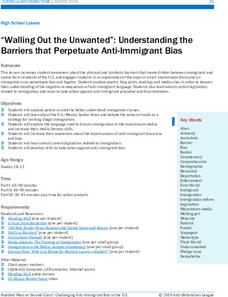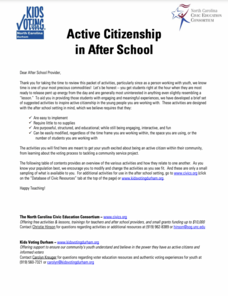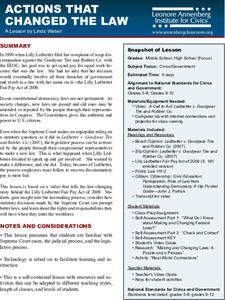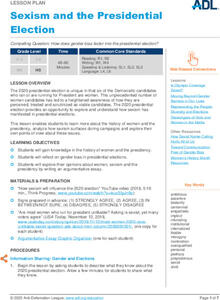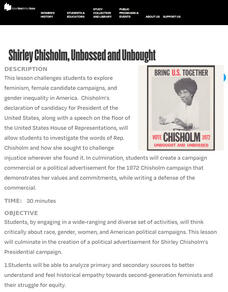Anti-Defamation League
“Walling Out the Unwanted”: Understanding the Barriers that Perpetuate Anti-Immigrant Bias
As part of a study of immigrant bias, high schoolers investigate the language used in blogs, readings, media reports, and current legislation whose language perpetuates xenophobia. They then consider ways they can get involved in...
Anti-Defamation League
Building Alliances
Bystander or up-stander? The final lesson in the "Looking Back Reaching Forward" unit asks participants to consider how they can become involved in encouraging change in their school and community.
Anti-Defamation League
Bringing It Home
The "Bringing It Home" lesson asks scholars to investigate segregation and diversity in their school. They research, collect, and analyze local demographics. After reflecting on their personal experiences with cliques and social...
Anti-Defamation League
Sixty Years Later
Has any progress been made in desegregating schools since 1954's Supreme Court case Brown v. Board of Education? To find out, class members examine charts and graphs representing U.S. schools' racial, ethnic, and socioeconomic...
Anti-Defamation League
With All Deliberate Speed
Has the integration of U.S. schools proceeded "with all deliberate speed?" Has progress been made? Those are the questions young historians must consider as they examine the barriers to and opportunities revealed in a study of timelines...
Anti-Defamation League
The Road to Brown
As part of the study of segregation in U.S. schools, scholars research and create a timeline of events that led to the historic Supreme Court case, Brown V. Board of Education. Groups research a topic or event that led to the decision,...
Carolina K-12
Active Citizenship in After School
Active citizenship is the bedrock of any great democracy. Continue the trend by teaching the next generation about voting rights and the functions of elections in society. The variety of activities in the resource includes a human...
Carolina K-12
Sample Test: The Judicial System
From Marbury v. Madison and original jurisdiction to Gideon v. Wainwright and civil appeal, here is a simple and comprehensive assessment on the judicial system of the United States.
Carolina K-12
The Electoral College
Is the Electoral College the best method of electing the president of the United States? Your young historians will write a persuasive essay discussing the historical perspective of the college, pros and cons, and a final argument for or...
Project Tahoe
Does the Use of Torture on Enemy Combatants Violate the 8th Amendment?
Tackle ethics in your high school history classes with a Socratic seminar about torture as a means for obtaining information. The plan allows for pupils to take the reins during the seminar. On the first day, class members read several...
A&E Television
Documenting Democracy: Lesson Plans on the United States Constitution
Balance and compromise. Class members come to understand the importance of these concepts as they investigate the concerns of the various stakeholders and how the format of the Constitution addressed these concerns.
Annenberg Foundation
Actions that Changed the Law
The Fair Play Act of 2009 came about due to the actions of one woman. Young historians research Lilly Ledbetter and what she went through to get pay equal to that paid to men for the same work at Goodyear Tire and Rubber Company. The...
K20 LEARN
Electoral College: Does My Vote Count?
How can a candidate get the most votes, yet still lose the race for the presidency? This is has happened more than once in American history, including in the elections of 2000 and 2016. Using an activity for creating group notes, young...
K20 LEARN
Government Power: Do the Actions of Government Effect Me?
What does the government have to do with getting a driver's license? Including the calorie count for a meal on a restaurant menu? By discussing these kinds of questions and researching how concepts behind federal, state, and local...
Anti-Defamation League
Sexism and the Presidential Election
Young historians investigate how sexism impacted the 2020 United States presidential election. They examine media coverage of the six women candidates, engage in a four-corners debate reacting to statements about gender and the...
K20 LEARN
Government and Your Right To Vote: Voting Rights In America
Gaining voting rights was difficult over the course of decades, but the debate over who should actually be allowed to cast a ballot remains. Scholars explore the history of the struggle, including the fifteenth and nineteenth amendments,...
Center for Civic Education
Ronald Reagan and Executive Power
Article II of the United States Constitution grants Presidents executive powers in areas of international conflict, domestic and foreign policy. Using examples drawn from Ronald Reagan's presidency, class members are asked to consider...
National Woman's History Museum
Shirley Chisholm, Unbossed and Unbought
An engaging resource introduces young historians to Shirley Chisholm, the woman, the Black congresswoman, the activist, and the candidate for President in 1972. Class members study primary sources, watch a video of her announcing her run...
K20 LEARN
LBJ and Voting Rights
Challenges to voting rights is not a new thing. Using President Lyndon B. Johnson's 1965 "The American Promise" speech on voting rights as a starting point, young historians research current voting rights laws and challenges.
K20 LEARN
Slavery in the Constitution
Young historians may be surprised to learn that the Constitution of the United States includes provisions that protect the institution of slavery. Groups examine four clauses of the Constitution, as well as other primary sources, and...
K20 LEARN
Show Me Your Credentials: Voting In America
The debate over voting rights continues. To begin their study of voting rights, class members first vote on proposed new classroom rules. After a discussion of the activity, groups are given a copy of the 1965 Alabama Literacy Test and...
Newseum
The Press and the Presidency: Friend or Foe? How the President Is Portrayed
In theory, news reports should be fair and unbiased. Young journalists test this theory by selecting a current news story covered by various media outlets about the President of the United States. They then locate and analyze five...
PBS
Compare State Voting Laws Today with Laws of the Jim Crow Era
Georgia's law S.B. 202 is at the center of a lesson that asks young scholars to examine what critics say are Georgia's attempts to limit voting access to Black voters. Groups then investigate the voting laws in their own state, as well...
Franklin D. Roosevelt Presidential Library & Museum
Voting and Participation in Decision Making
"If you don't vote - you don't count." That's the big idea in this resource about voting and participation in the democratic process. The three included activities focus students on being informed voters, practicing voting for their...


